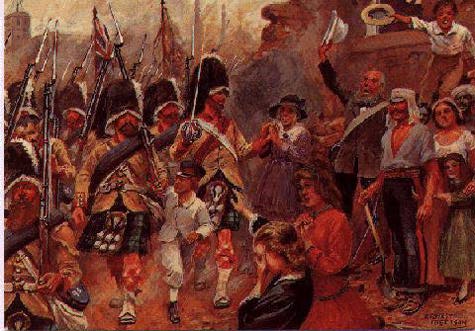For all the modernity-hate and past-worship in the Dark Enlightenment Community, there are very few historians around. Interest in history is also pretty low considering the circumstances. Sure there is a lot of interest and good scholarship in the immediate past, i.e. the evolution of the Cathedral, but little interest to ancient or foreign history.
That's a shame, because you can learn a lot from history. Perhaps it's because of HBD, the cornerstone of all our ideas. We are lately finding out that people have evolved faster than we thought, so the idea that we are different from our ancestors is spreading a while. That's mostly true, but don't believe the hype. We haven't evolved that much. Human power dynamics aren't based in gut adaptations, or even in the distribution of altruism genes. Power dynamics are wired deep, deep into our lizard brains, or at the very least monkey brains. Check out this video and tell me it's that different from our world:
[youtube http://www.youtube.com/watch?v=SSVF4CuXYno\]
One thing that liberals often say to us (like that Scott Alexander dude) is: what's so wrong about modernity? We got antibiotics and stuff, right? Well feminism or homo liberation can be dismissed as a matter of taste, so what's the big deal? Well surely the biggest deal is ethnic policy. The Cathedral is hell bent on bringing every single tribal people on earth into the West, give them perks and let them run wild without even trying to make them behave. See the Pakistani grooming scandal:
the victims are not with their mothers, they are held by social services in local authority 'care' homes. These 'care' homes operate as free brothels for the Pakistani rape gangs. The girls are under the control of the authorities, mostly white women social workers, who in some cases actually forced them back into the hands of their abusers and called them racist when they complained.
This just didn't happen before Progressivism. It was understood that multiculturalism was a bad idea, different peoples should not be mixed around. And you don't favor savages over civilized people.
Well what does history tell us? Let me tell you a funny story.
Japanese history is fascinating because of how short it is. The Japanese imperial house is the oldest of the world, dating to around 500 AD. But the funny thing is that the imperial house was the first historical polity to arise in Japan ever. That's right, Japanese history starts after the Roman Empire fell. Actually the first evidences of agriculture only date to around 300 BC, i.e. after Alexander the Great. For some reason farmers only came to Japan 7000 years after they began farming next door in China. 7000 years to finally round up the courage to cross the Tsushima strait.
Before farming, Japan had the Jomon culture, a fairly sophisticated hunter-gatherer culture known for their pottery and semi-sedentary lifestyle. Oldest pottery in the world actually. It seems Japan was so full of food that hunters could just stay in a place and hunt (mostly fish) their food from home. The Jomon had their fun for around 10,000 years until rice farmers came over from Korea and brought agriculture and metallurgy with them in 300 BC. The Yayoi culture they are called. These farmers moved eastward, and slowly built their own megalithic civilization, with massive tombs at all.
Upward mobility!
The Japanese government was using foreign barbarians to screw with their own people more than a thousand years ago. Why would they do that? Because the court didn't give a shit. Emishi tribal leaders stayed in the imperial capital, hang out with the Yamato nobles, and used their government-given riches and patronage to meddle with their old kin in the Northeast, which had grown a taste for Yamato culture, eventually taking Yamato names. The Emishi nobles got Yamato peasants to farm for them, and their tax-exempt status as "allies" of the court made them very rich. They also traded in fur, horses and gold, with little official oversight.
So you have the Emishi having a blast inside and outside of the borders. What happened then? Peace and prosperity? Hah. The "prisoners" became internal bandits preying on trade caravans from the provinces to the capital, and soon afterwards started rioting against the court. The second half of the 9th century was plagued with Emishi riots, which threatened to destroy the polity. Finally in 897 the court had had enough, and ordered that the Emishi were rounded up and deported back to their homeland in the Northeast.
The rioting stopped, but the Emishi did leave a long lasting influence in Japanese military history. The Yamato learned horseback archery from them, and the Emishi sword eventually evolved in the world-famous Katana. Katanas, horse-archery, local armies... the Emishi basically created what was to become the Samurai military culture of later centuries. After imperial rule collapsed in 1185, a military government was established in Kamakura, in the East country, and one of the first things they did was sent over a bunch of Samurais to the North to deal with the Emishi. The Emishi were obliterated, and were never heard from since. Their cousins, the Ainu, held up north in Hokkaido, where rice couldn't be farmed, so they were left alone by the Yamato until the 19th century. But that's another story.








